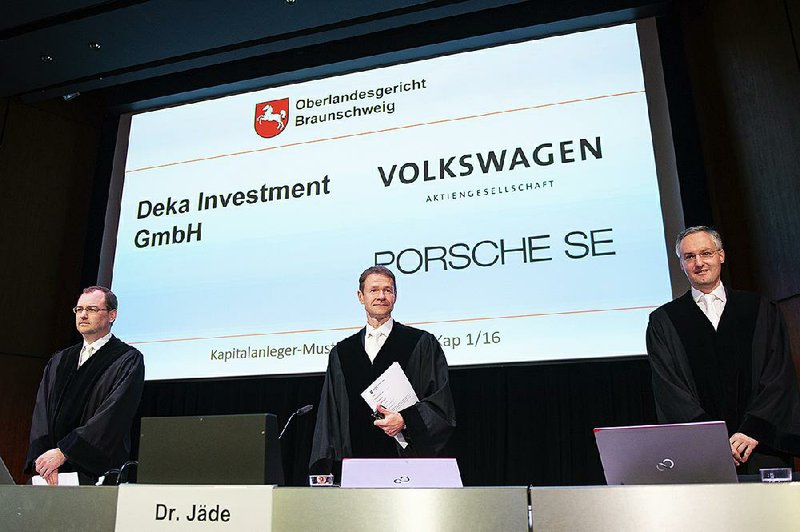FRANKFURT, Germany -- Trial proceedings have begun in a lawsuit brought against Volkswagen by investors who allege the company did not give them timely notice of its scandal involving cars rigged to cheat on diesel emissions tests.
Investors are seeking about $10.4 billion, saying Volkswagen didn't give them the information they needed to decide what to do with their shares before the scandal became public. The U.S. Environmental Protection Agency accused Volkswagen in September 2015 of installing devices to cheat on the emissions tests, sending the shares sharply lower.
In all, the company has set aside $31.7 billion for fines, settlements, recalls and buybacks.
The case that opened Monday in front of a three-judge panel of the higher regional court in Braunschweig involves claims from investors that will serve as a model for future cases, the dpa news agency reported. The case involves claims from Deka Investments and other shareholders. Proceedings are being held in a convention hall because of the number of participants and high public interest.
The company has said it met its duty to inform investors in time.
On the first day of the hearings, Presiding Judge Christian Jaede indicated that some claims may be too old to be considered. But judges said they must review whether VW should have disclosed the scandal years before the U.S. investigation.
The court could conclude that VW should have told markets in May 2014 about an American investigation based on a study showing that its cars emitted way too much pollution, Jaede said. The study was conducted by the International Council on Clean Transportation.
For that period, VW couldn't argue that it needed to hold back the release of information because of talks with regulators, which only started after the study was published, Jaede said.
Investors say VW should have released information about its use of a so-called defeat device between 2007 and July 2012. But they may not have a case because of time-limit rules and because they may not be able to prove recklessness behind the nondisclosure, Jaede said after opening the hearing.
The company has argued that previous industry cases of emissions violations were settled with more modest penalties and that Volkswagen's leaders did not know it would face a sweeping violation notice that cost it billions of dollars and severely damaged its reputation.
Volkswagen has admitted to rigging engine-control software in the U.S. to turn down emissions controls when vehicles were not being tested. It said 11 million vehicles worldwide could be affected. The vehicles passed certification tests but spewed up to 40 times the U.S. limit of harmful nitrous oxides during everyday driving.
The company pleaded guilty and agreed to pay $4.3 billion in fines and penalties. Two executives were jailed in the U.S., and the company's former chief executive officer, Martin Winterkorn, was charged with wire fraud and conspiring to violate the Clean Air Act but cannot be extradited from Germany. A criminal investigation is ongoing in Germany.
Shareholders filed the first cases against the company in October 2015. A year later, a wave of institutional investors followed, including BlackRock Inc., the California Public Employees' Retirement System and Allianz Global Investors. The U.S. is also a plaintiff in the case being heard in German court.
The proceedings were moved to the Braunschweig civic center to make space for the number of lawyers as well as investors who want to attend, though more than two-thirds of seats in the audience weren't filled Monday.
VW and Porsche Automobil Holding SE, which is also a defendant in the case, both said they informed investors correctly at each stage.
One of the key issues of the dispute is whether any payouts require that VW's board members knew about the cheating or whether it's enough that managers ranking below them were aware, Jaede said. When settling with U.S. regulators, VW admitted that some non-board executives were aware of the cheating but that board members didn't learn about it until 2015.
"This is one of the major contested issues of the case," Jaede said.
Jaede said that for now, the judges remain split about the issue but will work to reach a consensus after getting more written arguments from both sides. Only then they will also decide on whether to hear witnesses. The burden of proof that the board was in the dark is on VW, the judge said.
The court will resume hearings today.
Information for this article was contributed by staff members of The Associated Press and by Karin Matussek of Bloomberg News.
Business on 09/11/2018

